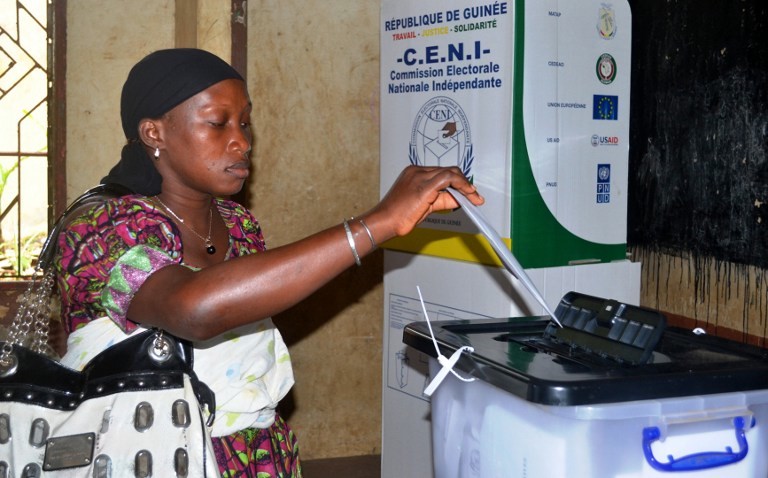SUMMARY
This is AI generated summarization, which may have errors. For context, always refer to the full article.

CONAKRY, Guinea – Guineans have voted in the first parliamentary elections for more than a decade in the troubled west African nation, after numerous delays and a campaign marred by deadly unrest.
Voters on Saturday, September 28, chose from more than 1,700 candidates vying for 114 seats in a national assembly, which will replace the transitional body that has been running the country since military rule came to an end in 2010.
The vote, originally due within six months of the swearing-in of President Alpha Conde in 2010, had been delayed amid disputes over its organization, stoking deadly ethnic tensions that have dogged Guinean politics since the country’s independence from France in 1958.
The campaign had been marred by days of violence between government and opposition activists which saw more than 70 people wounded and a trainee policeman killed. But no major incident was reported Saturday.
“We faced the challenge of a huge turnout. We are moving towards a participation rate of over 80 percent. We had a calm day of voting and there was no violence – Guineans behaved well,” election commission chief Alpha Yero Conde told reporters.
Large crowds gathered in the capital Conakry for what was regarded as Guinea’s first genuinely democratic parliamentary election. Polls held during the military dictatorship in 2002, which were faced with opposition boycotts, were widely dismissed as a sham.
“These elections will allow us to emerge from a chaotic five-year transition,” the president told reporters on the eve of the vote, expressing the hope that Guinea was about to enter a new era of prosperity.
Ballot-counting began in some polling stations as soon as voting ended, continuing into the small hours under lamp and torch light in some Conakry centers.
However complete provisional results aren’t expected until Wednesday, October 2.
Despite hopes that the election will be fair, the opposition has accused the president’s camp and the electoral commission of conniving to rig the vote, and protests in Conakry over recent years have often descended into violence.
Sidya Toure, a former prime minister and a prominent opposition leader, vowed early Saturday that “all of Guinea would be on the streets” if his supporters believed the results did not square with what they were seeing at the polling stations.
Conde’s main rival Cellou Dalein Diallo said many “anomalies” about which his party had complained had not been corrected – without elaborating – and accused the president’s party of trying to “cheat”.
Guinea’s Muslim and Christian leaders had called for a peaceful election day, urging all parties to put their country before their own interests.
Problems were reported in several polling stations in Conakry and in the regions, with heavy storms keeping voters away.
There were also reports of a lack of the indelible ink – used to distinguish who has already voted – and lost electoral cards.
Some centers stayed open beyond the official cut-off time to complete 10 hours of voting.
But many stations in the capital reported healthy crowds as the polls opened amid tight security.
‘I tell them to fear nothing’
A long line of soldiers queuing to vote applauded Conde as he left a polling station near his residence in the city centre wearing a blue traditional robe and sunglasses.
“I hope that the people of Guinea vote overwhelmingly and in peace, and I tell them to fear nothing,” he said.
“From now on the state will discharge its responsibilities and the country will be calm. And I hope everything goes well and that the expression of the Guinean people is respected.”
One of the poorest countries in the region despite its vast potential for mineral exploitation, Guinea was run by a succession of autocratic rulers after gaining independence from France.
A military junta took control in December 2008 at the death of president Lansana Conte, who had seized power in a coup 24 years earlier. In 2010, civilian rule was ushered in after a transition period and an election also marred by delays and violent ethnic clashes.
Politics in Guinea typically polarizes some two dozen ethnic groups who otherwise live in harmony alongside each other – with the Fulani the largest at around 40 percent of the population followed by the Malinke and Soussou.
Conde, a Malinke, leads the Rally of the Guinean People and claims to espouse socialism while his main rival, Diallo, is a Fulani and heads the centrist liberal Union of Democratic Forces of Guinea (UDFG). – Rappler.com
Add a comment
How does this make you feel?
There are no comments yet. Add your comment to start the conversation.